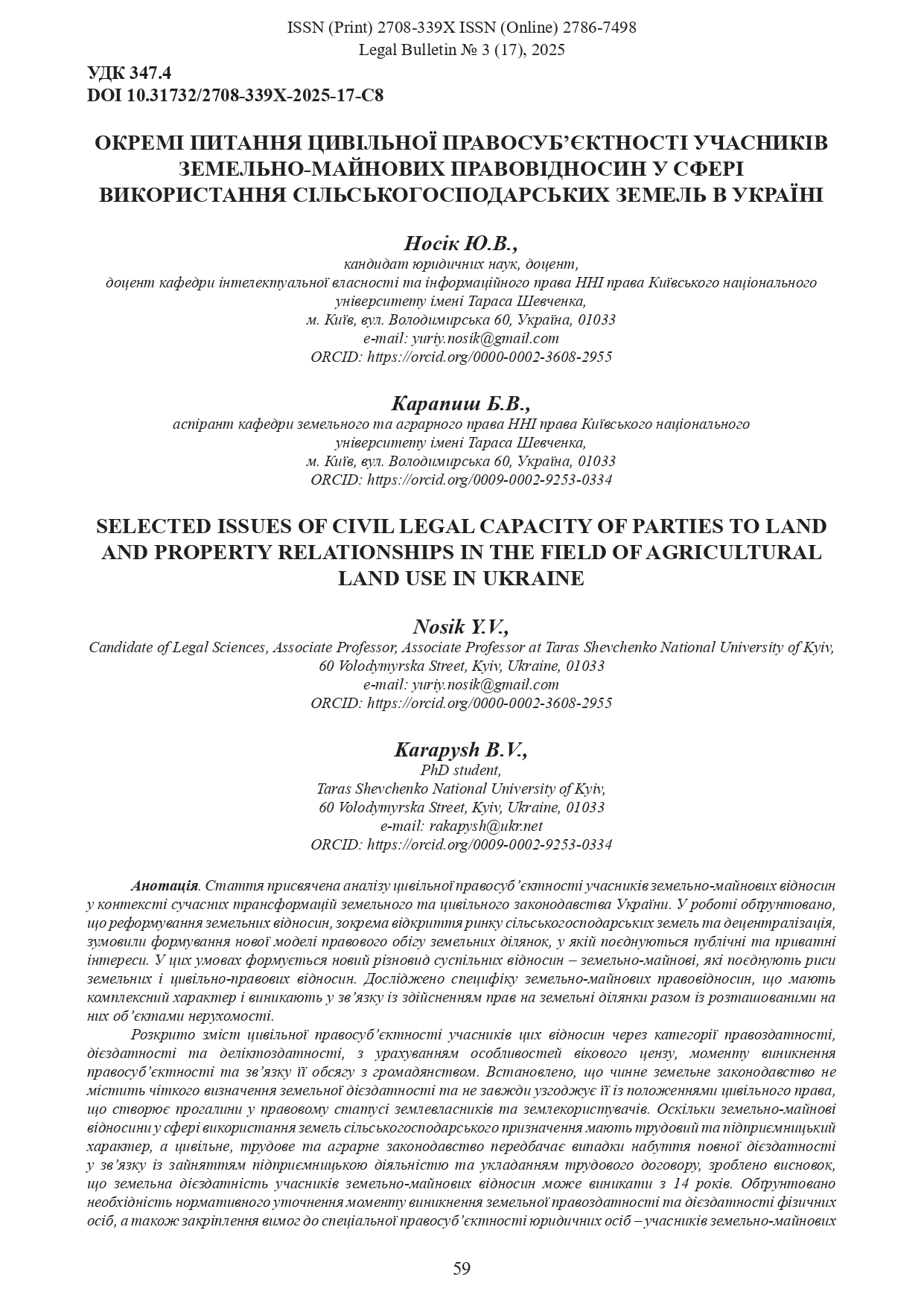SELECTED ISSUES OF CIVIL LEGAL CAPACITY OF PARTIES TO LAND AND PROPERTY RELATIONSHIPS IN THE FIELD OF AGRICULTURAL LAND USE IN UKRAINE
DOI:
https://doi.org/10.31732/2708-339X-2025-17-C8Keywords:
civil law, land law, land rights, land and property relations, land legal capacity, participants in land and property relationsAbstract
The article analyzes the civil legal capacity of participants in land and property relations in the context of modern transformations of land and civil legislation in Ukraine. It is argued that the reform of land relations, particularly the opening of the agricultural land market and decentralization, has led to the formation of a new model of legal circulation of land plots, which combines public and private interests. Under these conditions, a new type of social relations is emerging – land and property relations that combine the features of land and civil legal relations. The study examines the specifics of land and property relations, which have a complex nature and arise in connection with the exercise of rights to land plots together with real estate objects located on them. The content of the civil legal capacity of the participants in these relations is revealed through the categories of legal capacity, legal capability, and legal liability, taking into account the peculiarities of the age requirements, the moment of emergence of legal capacity, and the connection of its scope with citizenship. It has been established that the current land legislation does not contain a clear definition of land legal capability and does not always coordinate it with the provisions of civil law, which creates gaps in the legal status of landowners and land users. Since land and property relations in the field of agricultural land use have labor and entrepreneurial character, and civil, labor, and agrarian legislation provide for cases of acquiring full legal capability in connection with engaging in entrepreneurial activities and concluding employment contracts, it is concluded that land legal capability of participants in land and property relations may arise from the age of 14. The need for regulatory clarification of the moment of acquiring land legal capacity and legal capability of individuals, as well as the establishment of requirements for the special legal capacity of legal entities – participants in land and property relations, is substantiated.
References
Карапиш Б. В. Правове регулювання відносин майнового найму у сфері використання земель сільсько- господарського призначення в Україні. Дис. … доктора філософії за спеціальністю 081 «Право» у галузі знань 08
«Право». Київський національний університет ім. Тараса Шевченка. Київ. 2025. 236 с.
Колодій А., Копейчиков В., Лисенков С. Теорія держави і права : навч. посібник. Київ : Юрінком Інтер. 2002. 368 с.
Нечитайло Т., Луць В. Поняття цивільної правосуб’єктності та її елементів. Актуальні проблеми вдоскона- лення чинного законодавства України. 2015. №. 39. С. 166–174. URL: http://nbuv.gov.ua/UJRN/apvchzu_2015_39_17
Про санкції: Закон України від 14 серпня 2014 року № 1644-VII. Відомості Верховної Ради. 2014. № 40. ст.2018.
Павлюк О.В. Іноземні особи як суб’єкти здійснення прав на землю в Україні. Монографія. Київ-Ніжин. Видавець Лисенко М.М. 2024. 228 с.
Носік В. В. Право власності на землю Українського народу: монографія. Київ: Юрінком Інтер, 2006. 544 с.

Downloads
Published
How to Cite
Issue
Section
License
Copyright (c) 2025 Носік Ю.В., Карапиш Б.В.

This work is licensed under a Creative Commons Attribution 4.0 International License.




